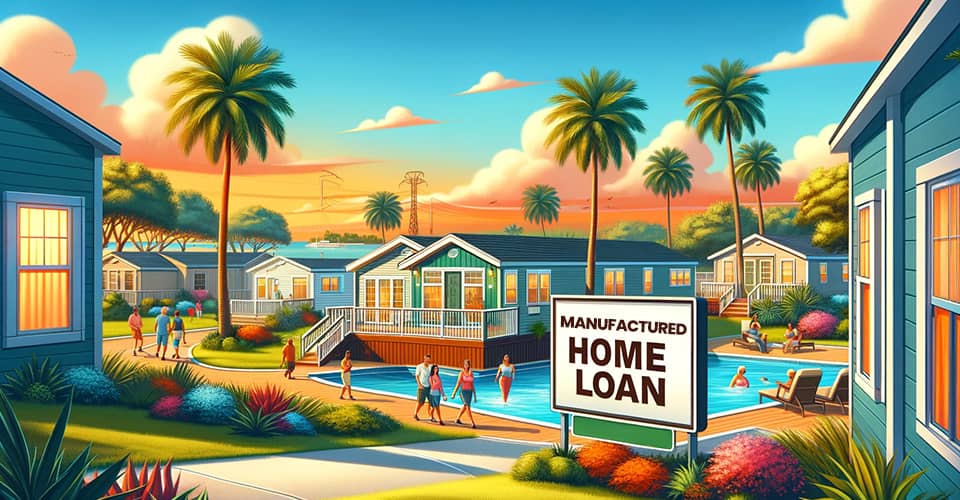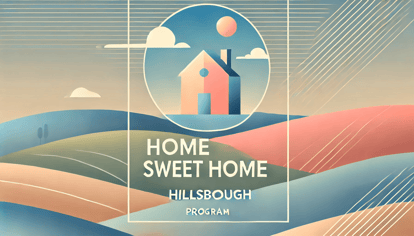Florida Manufactured Home Loan Program
Florida Manufactured Home Loan Program Overview
The Florida Manufactured Home Loan Program provides affordable loans to people who want to buy manufactured homes in Florida.
It helps promote affordable housing by offering good loan options to those who qualify.
Purpose of the Program
The Florida Manufactured Home Loan Program was created to help lower—and middle-income people own homes. This program started because real estate prices are rising, and affordable housing is needed.
It tries to make it easier to own a home by providing low-interest rates and flexible loans for manufactured homes in Florida.

What is a Florida Manufactured Home Loan?
A Florida manufactured home loan is a special type of loan for buying a manufactured or mobile home in Florida. These homes, built in factories and moved to a location, are usually about 30% to 80% cheaper than on-site homes.
You typically need a good credit score, a steady income, and a down payment to get this loan. Different loans are available, like FHA, VA, and USDA loans, which often have lower down payments and flexible credit rules.
Eligibility Requirements
Here are the key eligibility requirements for obtaining a manufactured home loan, with estimated figures based on the average price of a manufactured home:
Credit Score and Income
Typically, a credit score of 580 or higher is required. You must demonstrate a stable income sufficient to cover monthly payments and other obligations.
Down Payment
Assuming the average price of a manufactured home is around $100,000, the down payment would range from $3,000 to $20,000, depending on the specific loan program (3% to 20%). However, various first-time homebuyer grants in Florida can help you buy a manufactured home with zero down payment.
Benefits of the Program
This program translates the dream of homeownership into a readily achievable reality, thanks to an array of benefits uniquely tailored for prospective homebuyers and real estate investors.
-
Low-interest rates that significantly reduce monthly payments.
-
Flexible repayment terms up to 30 years.
-
Availability of both fixed and variable rate loans.
-
Possibility to finance up to 100% of the home's value.
-
No prepayment penalties.
-
Applicable for both new and used manufactured homes.
- Eligibility to residents irrespective of their income level.
Key Changes in 2024
Growth in Production and Shipment
The production and shipment of manufactured homes have seen a significant increase, with a noted 27.2% rise in shipments in February 2024 compared to the previous year.
This suggests a growing market and availability of manufactured homes.
Luxury and Quality Improvements
There has been a noticeable shift towards higher quality and luxury in manufactured homes. These homes are now being built with high-quality materials and include rich amenities.
The modern luxury manufactured home emphasizes quality construction and innovative designs, aligning with evolving consumer needs.
2024 Government Initiatives and Funding
The Biden-Harris Administration has introduced new actions under HUD to support the affordability and availability of manufactured homes.
This includes a new federal funding opportunity called the PRICE Program, which aims to preserve and revitalize manufactured housing and communities with a $225 million grant.
Additionally, FHA Title I Manufactured Home Loan Program updates are intended to make financing more accessible and in line with current market pricing.
Growing Appeal To Younger Buyers
The appeal of manufactured homes is broadening across all age groups.
The outdated stigma that manufactured homes are primarily for retirees is changing. More young people and families are considering them as a viable housing option due to their affordability and flexibility.
Loan Types
FHA Manufactured Home Loan
With an FHA loan, the top benefit is the low down payment requirement of just 3.5%, making homeownership more achievable for many buyers.
You typically need a steady income and a down payment of at least 3.5% for an FHA loan. The minimum credit score requirement is generally around 580, but borrowers with lower scores may still qualify with a higher down payment.
VA Manufactured Home Loan
VA loans stand out because they require no down payment. They are exclusively available to veterans, active-duty service members, and their families.
While there's no official minimum credit score requirement, most lenders prefer a score of at least 620 for VA loans.
USDA Manufactured Home Loan
The key advantage of USDA loans is their zero down payment option and the opportunity to purchase homes in eligible rural areas, which enhances accessibility to homeownership for low-to-moderate-income families.
The minimum credit score requirement for USDA loans is typically around 640, but some lenders may accept lower scores with compensating factors.
How to Apply for a Manufactured Home Loan in Florida
Start by collecting the documents you need, such as proof of income, your credit history, and information about the manufactured home.
Then, submit your application online and wait for approval from MakeFloridaYourHome. To improve your chances of success, make sure your application is complete and accurate.
As a first-time applicant, take advantage of help from loan specialists and consider getting pre-approved. Knowing how much you can borrow early on can help you make better decisions.
Also, look for loan programs designed for first-time buyers that offer good terms. This can increase your chances of getting a good loan in 2024.
Required Documentation
Applicants should come prepared with proof for the Florida Manufactured Home Loan application.
-
Proof of Identification: Driver's license or government-issued ID.
-
Employment Verification: Contact information for your employer or proof of self-employment income.
-
Credit History: Check your credit score and obtain a credit report.
- Manufactured Home Details: Basic information about the home you're purchasing.
These documents should be the minimum required for a prospective buyer to start applying for a manufactured home loan in Florida.
Remember, a well-documented application tells a convincing story of your creditworthiness. Consult with a loan officer for specific document requirements.
Loan Application Process
Embarking on the Florida Manufactured Home Loan application process might seem complex, but it can be uncomplicated when you understand the sequence of steps.
Here are five essential steps prospective borrowers need to follow in 2024.
-
Pre-application preparations: MakeFloridaYourHome will prepare all required paperwork and evaluate your financial status and readiness.
-
Loan pre-approval: If pre-approval is offered, apply to learn your potential borrowing limits.
-
Property Selection: Select a suitable manufactured home that meets program specifications.
-
Application submission: Fill out the official program application thoroughly and include all required documents.
- Await approval: After submitting your application, await official communication about your application status.
Tips for a Successful Application
Here are three key tips for a successful application for a manufactured home loan in Florida:
Before applying for a loan, check your credit score and review your finances. MakeFloridaYourHome will use this information to determine your eligibility and interest rate. If your credit score needs improvement, take steps to address any issues before applying.
Collect all necessary documentation, such as proof of income, employment verification, and identification, as early as possible. Having these documents ready will streamline the application process and demonstrate your preparedness to the lender.
Take the time to understand the various loan terms and options available to you. Make sure you understand the terms of the loan you're applying for and choose the option that best fits your financial situation and long-term goals.
FAQs about Florida's Manufactured Home Loan Program
Helping you navigate the ins and outs of Florida's Manufactured Home Loan Program.
Can I use the loan for both new and used manufactured homes?
Absolutely! Florida's Manufactured Home Loan Program covers both new and used homes. Whether you're eyeing a brand-new model or a pre-owned one, the program's got you covered.
Remember, all used homes must be inspected thoroughly to meet HUD code guidelines.
What fees are associated with the loan?
Expect common fees like origination fees and appraisal charges and extras like recording fees and state taxes. To get a clear picture, ask your lender for a breakdown of all costs, from processing fees to inspection charges.
Are there any down payment requirements?
Yes, a down payment is required. The amount depends on factors like the type of property and your financial situation. A larger down payment could mean better loan terms, so it's worth planning strategically.
Can I get pre-approved for a manufactured home loan?
Absolutely! Pre-approval is available, giving you a head start in the competitive financing world. It helps lenders understand your financial background, speeding up the process when you find the right property.
How long does it take to process the loan application?
It typically takes 60-90 days from application to final approval. The timeline can vary based on the completeness of your documents and market conditions.
Staying organized and responding promptly to any requests from your lender can help speed things up.
What happens if I default on the loan?
Defaulting on the loan means not meeting repayment terms, which could lead to foreclosure and damage your credit score. But don't panic!
Open communication with your lender is key. They may offer solutions like loan modifications or repayment plans to help you get back on track.
Can I include renovation costs in the loan?
In some cases, yes. If you're purchasing a manufactured home that needs renovations, you may be able to include the renovation costs in the loan amount.
However, this will depend on the lender and the extent of the renovations needed. Be sure to discuss this option with your lender during the application process.
What are the income requirements for the loan?
Income requirements vary depending on the lender and the specific loan program. Generally, lenders want to see that you have a stable source of income sufficient to cover your monthly mortgage payments. This can include income from employment, self-employment, retirement benefits, or other sources.
During the application process, be prepared to provide documentation of your income, such as pay stubs, tax returns, and bank statements.
Are there any special financing options available for first-time homebuyers?
Special financing options are available for first-time homebuyers through MakeFloridaYourHome. These options could include lower down payment requirements, reduced interest rates, or other incentives to help first-time buyers achieve their homeownership goals.
Be sure to ask us about any available programs for first-time homebuyers and whether you qualify.
Bottom Line
The Florida Manufactured Home Loan Program allows potential homebuyers to access affordable financing solutions for manufactured homes within the state.
Key benefits of the program encompass low-interest rates, flexibility in repayment terms, and the opportunity to finance up to the home's entire value.
Ready to make Florida your home? Explore your financing options today with MakeFloridaYourHome.
With over 50 years of mortgage industry experience, we are here to help you achieve the American dream of owning a home. We strive to provide the best education before, during, and after you buy a home. Our advice is based on experience with Phil Ganz and Team closing over One billion dollars and helping countless families.

About Author - Phil Ganz
Phil Ganz has over 20+ years of experience in the residential financing space. With over a billion dollars of funded loans, Phil helps homebuyers configure the perfect mortgage plan. Whether it's your first home, a complex multiple-property purchase, or anything in between, Phil has the experience to help you achieve your goals.


 By
By  Edited by
Edited by 






